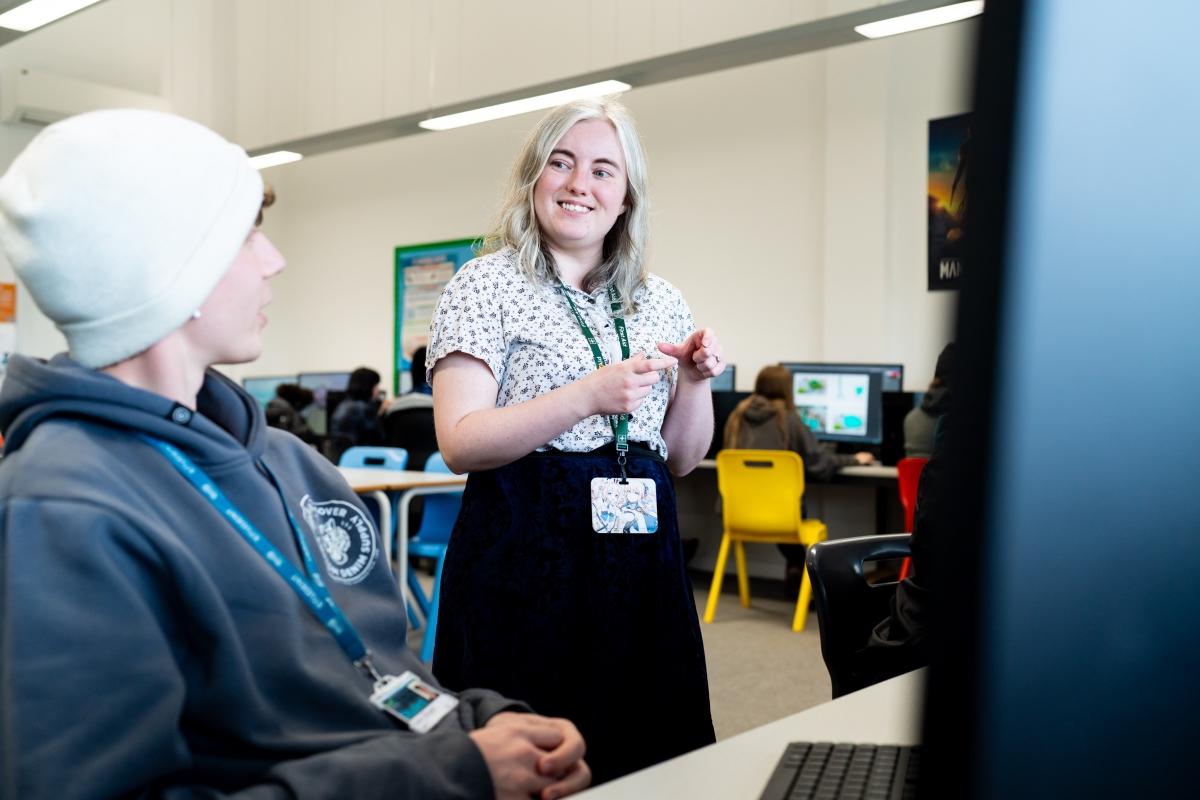BTEC Level 3 National Extended Diploma in Information Technology
If you enjoy learning about computers and Information Technology, then the Extended Diploma in IT will be of great interest to you. Building on your existing knowledge, this course will stretch and challenge your IT knowledge and skills. This course will cover a range of areas related to how Information Technology continues to develop and integrate into a variety of industries and businesses. You will be introduced to industry standard software, programming languages and workflows to explore practical scenarios surrounding the use of IT.
Key information
Computing & IT / Full Time / Level 3 Extended Diploma

Why choose this course?
You will work on a wide variety of interesting practical and theoretical projects. By the end of this course you will be con dent in planning, designing and writing computer programmes, building websites, developing mobile phone apps, configuring and managing networks, and analysing and designing complex computer systems for business. You will understand how to configure and protect an IT system from attack and subsequent data loss. You will be able to describe the impact that IT systems are having on our world and how businesses are using the latest technologies to gain a competitive edge.
Upon successful completion of this course you will have a comprehensive understanding of modern Computer Science. You will be well prepared to enter the work place as an IT professional or to go on and study a Computer Science degree at university.
Lessons take place in specialist IT rooms with networked PCs. Your lecturers will be specialists in their field who will teach you through a variety of demonstrations, lectures and by helping you undertake a variety of practical tasks. You will have access to hardware and networking lab facilities for the practical parts of the course.
What will I learn?
The course is Modular consisting of two externally and four internally assessed units.
Information Technology Systems: Information technology (IT) systems have a significant role in the world around us and play a part in almost everything we do. Having a sound understanding of how to effectively select and use appropriate IT systems will benefit you personally and professionally.
You will explore the relationships between the hardware and software that form an IT system, and the way that systems work individually and together, as well as the relationship between the user and the system. You will examine issues related to the use of IT systems and the impact that they have on organisations and individuals.
Creating Systems to Manage Information: In order to produce information to support many business processes as well as our social lives, relational databases are widely used to manage and process data. From the smallest in-house systems to stock control systems for large online retailers, databases are repositories of information that are a significant part of organisational operating requirements.
You will examine the structure of data and its origins, and how an efficient data design follows through to an effective and useful database. You will examine a given scenario and develop an effective design solution to produce a database system. You will then test your solution to ensure that it works correctly. Finally, you will evaluate each stage of the development process and the effectiveness of your database solution.
Using Social Media in Business: Social media websites are a popular way for people to communicate and share information with friends and family. People spend a lot of time on social media websites and they give businesses opportunities to interact with people, for example to promote their business, to encourage people to visit their e-commerce site and buy, to provide customer service. You may be familiar with social media for personal use and in this unit you will discover how it can be used in a business context.
Programming: Organisations and individuals increasingly depend on the functions and services offered by computing devices such as smartphones, tablets, laptops and personal desktop computers. You make use of computing programs when using an operating system or application programs such as word processing and spreadsheets. Understanding the concepts of high-quality software application design and development is key to ensuring that products are effective. As a programmer, you will need to understand the characteristics of different programming languages in order to select and apply appropriate methodologies to meet a client’s needs.
You will learn about computational thinking skills and the principles of designing and developing computer programs. You will apply computational thinking skills to design, develop, test, refine and review computer programs for a given range of purposes. By developing your analytical, problem-solving and programming skills, this unit will help you to progress to higher education or to employment as a software developer.
Website Development: Increasingly, organisations rely on websites to serve customers and, in some cases, to generate revenue. With millions of web pages being created daily, the need for websites to be engaging, innovative and desirable is important.
In this unit, you will review existing websites – commenting on their overall design and effectiveness. You will use scripting languages such as Hypertext Markup Language (HTML), Cascading Style Sheets (CSS) and JavaScript® and a simple text editor, or rapid application development tools. Finally, you will reflect on the website design and functionality using a testing and review process.
Computer Games Development: The computer games industry has been growing year on year and has become a multi-billion pound industry. With the prevalence of computing devices, games consoles and mobile devices, this growth shows no sign of slowing.
In this unit, you will investigate the technologies used in the computer gaming industry and the implications they have for users, developers and organisations. You will analyse how user needs and preferences impact on game design and how target technologies affect the design and development of a computer game. Finally, you will design, create and review a computer game to meet requirements and reflect on the skills and understanding applied during the design and development process.
Assessment Arrangements
The course assessment is mainly via assignments, some will be set by your lecturers and some will be set and marked by the exam board. You will normally have 3 or 4 assignments to complete for each subject. All subjects will be taught for a minimum of 60 hours, but they are not all of the same length. Some of the more challenging subjects will have 90 hours and some will have 120 hours. The grades for all subjects contribute towards your overall grade that is awarded at the end of your 2-year course.
Information & Support
Students will take the BTEC Level 3 90-credit qualification in the first year. The qualification is equivalent to 3 AS level qualifications. You will be required to successfully complete the first year to progress to the full BTEC Level 3 Extended Diploma.
Where will it take me?
The majority of students continue on to computing and IT related degree courses at university, such as Computer Science, Computer Forensics, Game Development, Digital Graphics and Animation, and Artificial Intelligence. The course also forms an excellent skills base for employment in the IT industry as a technician or developer.
What will I need?
You will need four GCSEs at grade 4 including a 4 in English (Lang or Lit.) and or Maths.
Whilst it is possible to re-take GCSE English and Maths at Callywith College, students can only study one of these subjects alongside our Level 3 courses and therefore all students must have at least one grade 4 in English or Maths at the point of enrolment (other course specific entry requirements apply).
Additional Information
To obtain more information about this course, please call: 01208 224000 or email enquiry@callywith.ac.uk



